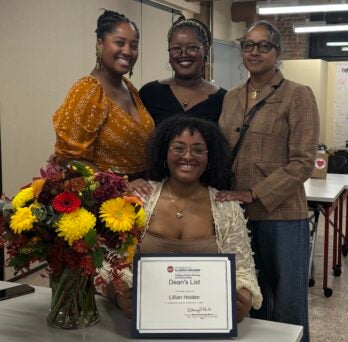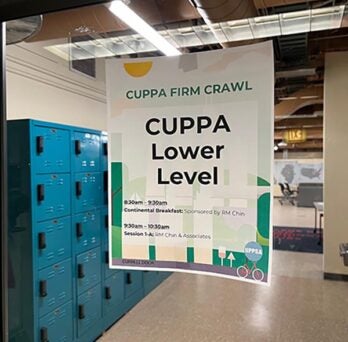Want a city that works? Plan it.
The Master of Urban Planning & Policy (MUPP) program at UIC is the only professional planning program in the Chicago metropolitan area that is fully accredited by the Planning Accreditation Board. With a large and diverse faculty and student body, the MUPP program offers a comprehensive range of courses, including many specialized electives and studios. Class sizes are typically small, with multiple sections of required courses offered in both day and evening. Graduates can connect to a large network of alumni, both locally and across the region, country, and world.
Call to Action:
Curriculum
Degree Requirements
A minimum of 60 hours of graduate credit is required. The program is divided into five components: core courses, specialization courses, electives, internship, and a portfolio or thesis. Students should consult the MUPP handbook and select courses in consultation with their advisor. See an overview of the MUPP application procedure here.
sp
Five areas of specialization are offered to students of the MUPP program. Students may pursue a specialization set by the department (listed below) or they may develop a user-defined specialization, subject to advisor and department approval. Students wishing to pursue a specialization of their own design should consult with their academic advisor. Twelve (12) semester hours are required to complete each specialization, however each has varying course requirements.
Specializations are:
internship
The Professional Practice Internship (UPP 590) consists of 300 hours of fieldwork.
All internships allow students to build their professional network and apply their skills in real world planning situations. Chicago offers a multitude of internship opportunities ranging from government agencies and regional planning organizations to community groups and private consulting firms.
MUPP students regularly intern at places like:
- American Planning Association
- Austin Coming Together
- Chicago Department of Planning and Development
- Chicago Metropolitan Agency for Planning
- Chicago Rehab Network
- Chicago Transit Authority
- City of Des Plaines
- Elevate Energy
- Federal Home Loan Bank of Chicago
- Holsten Real Estate Development Corporation
- Local Initiatives Support Coalition
- Metropolitan Planning Council
- Regional Transit Authority
Although most students do their internships in the Chicago area, students may also seek an internship placement in another U.S. location or even a foreign country.
Internship Connection
The Internship Connection is an annual event hosted by the UIC Master of Urban Planning and Policy program each spring semester. This event provides students with the opportunity to connect with organizations in the urban planning field through one-on-one interviews. Conducted online, the event features 25-minute interview slots where students can engage directly with potential employers.
Prior to the event, students will have access to a list of participating organizations and their available internship positions, which may range from summer internships to year-round opportunities. Interview sign-ups operate on a first-come, first-served basis, allowing students to select the positions that align with their interests and career goals. This event is one of the many ways UIC’s Urban Planning program integrates students into the professional world, helping them gain hands-on experience, build industry connections, and transition into their careers.
For more information, visit the Internship Connection page, here.
portfolio
MUPP students are required to prepare an Urban Planning Portfolio to fulfill the requirements of the MUPP program. Most portfolio materials come from excerpts and refinements of previously completed UPP coursework. In addition, the portfolio includes reflective documents, such as a professional statement, goals, and a resume. The portfolio encourages student reflexivity and self-assessment and ultimately provides graduates with a useful career tool by demonstrating knowledge, skills, and capabilities to prospective employers. Students take UPP 595 Portfolio Development Seminar (2 credits) in their final semester of the program, where they receive guidance on developing the portfolio. A completed and approved portfolio is necessary to pass UPP 595.
In lieu of the Master’s Portfolio, students have the option of writing a thesis. The thesis is a more traditional piece of academic research and differs from the portfolio with respect to content, credit hours, and advising. The thesis frequently involves the analysis of historical materials and use of secondary sources. An exploration of planning theory or research methods would also be appropriate in a thesis. Students interested in pursuing the thesis option should consult with their faculty advisor early in their final year of the program.
FAQs
cost
Academic Year 2024-2025 Tuition: $22,292 (In-State) / $36,082 (Out-Of State)
Tuition increases will be posted as soon as they are finalized. More information on tuition and billing can be found on the Office of the Registrar. The most up-to-date information can be found here.
n
A limited number of MUPP students are awarded financial support upon admission through Teaching Assistantships (TA), Research Assistantships (RA), or Graduate Assistantships (GA). Only applicants who submit their applications before the January 15th funding deadline will be considered for an appointment alongside their admission.
These appointments include a stipend, tuition coverage, and can include a tuition differential waiver (details at https://grad.uic.edu/assistantships/). Continuation is contingent on satisfactory academic progress (as outlined in program handbooks) and successful completion of assigned duties.
na
Teaching Assistantships (TAs), Research Assistantships (RAs), and Graduate Assistantships (GAs) each serve distinct roles while offering tuition waivers for appointments between 25% and 67% Full-Time Employment (10–26 hours per week).
- TAs primarily support instruction through activities such as leading discussions, grading, preparing course materials, and providing academic assistance.
- RAs are dedicated to research-related tasks, such as conducting experiments, analyzing data, and preparing publications.
- GAs focus on administrative functions, including clerical tasks, technical support, event management, and outreach.
More details about assistantships can be found here.
n/a
TA and RA opportunities are communicated directly to students via their UIC email addresses, including details and application instructions as they become available.
Can I work full-time and complete the MUPP program?
Many MUPP students balance full-time work with their studies. Both day and evening classes are offered to accommodate varying work schedules. However, it is ultimately at the discretion of each student to decide what works best with their individual schedule.
Some classes and specializations require more work outside of class than others, so students are encouraged to consult with their academic advisors to create a course plan that aligns with their personal and professional goals. Additionally, reaching out to professors for syllabi can offer insight into class structure and workload, helping students assess whether a course is manageable alongside their other commitments.
Is it possible to complete two specializations?
All students must declare one concentration. Students can take core classes from other specializations and have them count as electives. However, priority for enrollment is always given to first-year students within that specialization. Elective students will only be able to register if space remains after first-year students have completed their registration.
For those interested in combining courses from different areas, there is also the option to develop a user-defined specialization tailored to individual interests. This requires approval from an academic advisor and the department. Students considering this option should consult with their advisor during their first semester.




